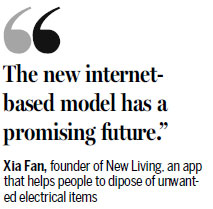Internet and apps boosting businesses
Updated: 2016-07-25 08:05
By Zheng Jinran(China Daily)
|
|||||||||
China has a wide range of electronic-waste business models, from collection to dismantling and further processing, based on easier access to the internet. The developments are fueling the growth of environmentally friendly platforms for discarded e-waste.
Li Ting, 32, from the Xicheng district of Beijing, never realized that selling her obsolete washing machine would be as easy as simply submitting an application via an app on her phone and waiting for the collector to arrive at the appointed date.
"It took less than 10 minutes to finish the deal, instead of passively waiting for mobile collectors in the community, which could take months," she said, adding that before the app came online she didn't have time to sell an old microwave oven, so she simply dumped it in a garbage pile.
New Living, the app Li used, allows users to submit online applications and specify a suitable collection date. The system is a convenient way of selling unwanted electronic devices.
"The traditional model of e-waste collection had lasted for decades, and it needed updating. The rising demand for e-waste disposal has been facilitated by the new model, based on easier access to the internet," said Xia Fan, founder of New Living, which is based in Beijing.

E-waste collected via the app is taken to professional plants, where it is dismantled and further processed, he said, adding that the company has collected more than 30,000 items since it launched in January last year.
"The new internet-based model has a promising future," Xia said.
According to the White Paper on Waste Electrical and Electronic Equipment Recycling Industry in China 2015, since last year, more companies - electronic device manufacturers, retailers and independent groups - have ushered in a new era by tapping into the booming e-waste business with similar internet-based models.
Now, China's new model is being touted as a global model. "We truly believe that innovative ideas, alongside greater public-private partnerships, are key for a truly integrated, systematic and coordinated solution of e-waste management," said Patrick Haverman, deputy country director of the UN Development Program China, at a recent e-waste business forum in Beijing.
UNDP promoted a new model for developing countries at the forum: the Baidu Recycle App, which connects consumers, dismantlers and manufactures via smartphones. Since 2013 it has expanded to 22 Chinese cities, and Baidu is now cooperating with the UN to expand the service globally, said the country's dominant search engine during an email exchange with China Daily.
Shan Mingwei, who worked as a researcher on the white paper, said many of the companies operating new apps are in their initial phases and have a limited number of users, so it will take time to replace the large number of individual collectors and small workshops.
According to Baidu, in 2014, a pilot project in Beijing and Tianjin collected more than 11,000 items of discarded e-waste, but given the soaring volumes in the two municipalities, the number was too small to make a real difference.
Today's Top News
French president urges Britain to begin EU exit talks
Turkey to restructure its army after coup attempt
UK to keep close economic ties with Germany: May
China's Fosun buys UK's Wolves for 45 million pounds
Rio 2016: Russia loses doping appeal
Brussels police: Bomb aleart was false alarm
May takes center stage in parliament's box-office show
Turkey's failed coup to consolidate Erdogan's power
Hot Topics
Lunar probe , China growth forecasts, Emission rules get tougher, China seen through 'colored lens', International board,
Editor's Picks

|

|

|

|

|

|







